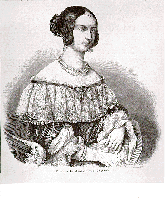|
|
When George IV died in 1830, the conservative "Times" wrote: "Never was a person less mourned by his fellow men than the late King. ... If ever George IV had a friend, a true friend, in any social class, so may we claim that his or her name never reached our ears." And seven years later, upon the death of his successor, the liberal "Spectator" reported: "Despite his weak will, his narrow-mindedness, his lack of cultivation and his obstinacy, William IV remained a popular monarch to the end. Yet this was a popularity based on a kind of public disdain, in no way on respect toward the monarch."
It was not only radical spirits who were calling for the establishment of the republic when the barely 18-year-old Victoria entered the throne in 1837. Due to the Salic law of hereditary succession in Hanover her uncle Ernst August, another son of George III, ascended to the throne there. Of all the sons of George III, Victoria's father Prince Edward had left the most favourable impression – but then again, he died young.




|

|
|






